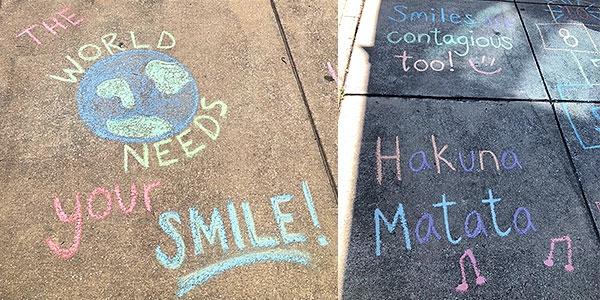Talking to Your Child or Teen about COVID-19

It’s important to have an open, honest conversation with your child about the coronavirus to help support their needs and understanding during this stressful time. No matter the age of your child, determining what your child already knows will help you to gain insight into how they are interpreting what is happening around them. It can be difficult to know how to answer your child’s questions and what information to share with them, so here are some tips on how to talk with your child about COVID-19.
For the Preschool-Age Child (3-5 years old)
A preschool-age child’s developmental understanding of illness is vague, simplistic, and magical (belief that one’s own thoughts, wishes or desires can influence the external world). Children in this age group are typically able to understand that if someone is sick, they might have a cough/not feel good and need to go to the doctor. Simple explanations such as, “we have to stay at home so we don’t get sick,” to explain why your child’s daily routine has changed are typically sufficient. This age group often believes that an illness or change in routine are punishment; it is important to reassure your child that they did not cause coronavirus and they are not being punished as events are canceled.
For the School-Age Child (6-11 years old)
The typical school-age child is able to comprehend external causes of illness and needs specific, detailed information about the illness to meet their developmental needs. This age group typically can comprehend an explanation along the lines of the following:
- COVID-19 is a new type of virus that is making people sick, it might cause someone to have a cough, fever, or body aches.
- A virus is so small that we cannot see it with our eyes; this is why washing your hands is very important, especially before eating or touching your face.
- Right now, it’s important that we stay at home and not go to school, the playground, etc., to help us stay healthy.
It is important to let your child lead the conversation; the goal is to help alleviate your child’s worries or fears. Sometimes providing additional, unwanted information can create the opposite effect.
For Teens/Adolescents (12-18 years old)
Teenagers are typically able to understand and comprehend various causes of illnesses, prevention, and symptoms. This age group often feels “invincible,” so it’s key to remind your teen that it is still important to practice social distancing and good hand hygiene, despite their young age. Ask your teen what they know about COVID-19 and clear any misconceptions they might have heard/seen on social media or the internet. Being open and honest, while also validating your teen’s fears and worries is important for this age group.
Children and teens react, in part, on what they see from the adults around them. When parents and caregivers deal with COVID-19 calmly and confidently, they can provide the best support for their children. If parents seem overly worried, children’s anxiety may rise. Parents should reassure children that health officials are working hard to ensure that people throughout the country stay healthy.
There are many ways to support your child during this uncertain time. When sharing information, it’s important to provide facts without promoting a high level of stress, to remind children that adults are working to address this concern, and to give children actions they can take to protect themselves. Teaching children positive preventive measures, talking with them about their fears, and giving them a sense of some control over their risk of infection can help reduce anxiety.
By:
Jennifer Duncanson, MS, CCLS
Heather Oakley, LCSW, OSW-C

